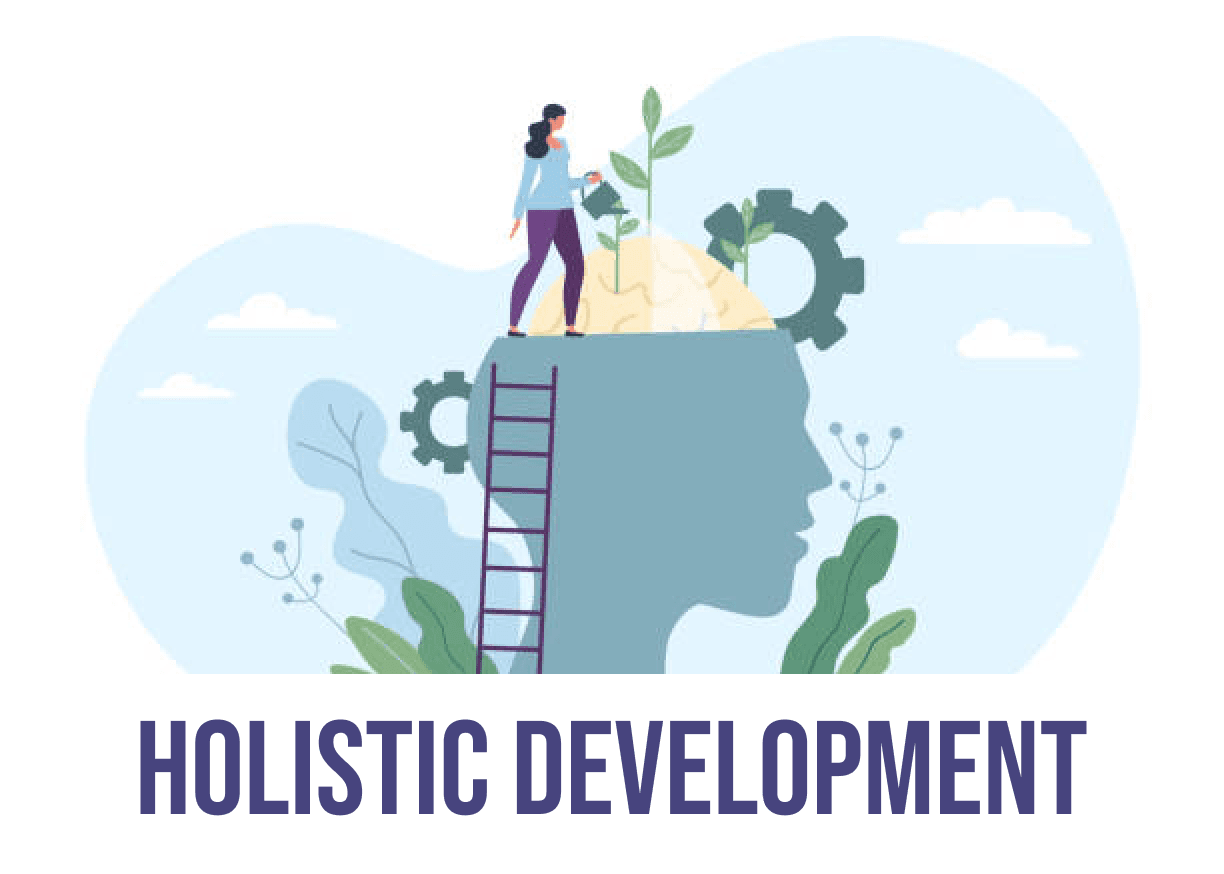The Long-Term Benefits of Holistic Development for a Child’s Career & Life
When it comes to nurturing a child’s future, parents and educators alike often focus on academic achievements. However, the real key to success lies in fostering holistic development in education. A holistic development in education approach ensures that children develop not just academically but also emotionally, socially, physically, and creatively. The long-term benefits of holistic development in education are far-reaching, impacting not only a child’s career but also their overall life satisfaction.
This blog explores how holistic development shapes a child's future, providing insight into its profound impact on career success and personal well-being.
What is Holistic Development in Education?
Holistic development in education refers to the process of nurturing every aspect of a child's growth within an educational context. This includes:
Cognitive development (mental skills and learning)
Emotional development (managing feelings and relationships)
Social development (interacting with others and understanding societal norms)
Physical development (motor skills, health, and fitness)
Creative development (imagination and artistic expression)
By fostering growth in these areas, holistic development in education ensures that children grow into well-rounded individuals equipped for life's challenges.
Why Holistic Development in Education Matters for Career Success
The world is changing rapidly, and the traditional view of education—where academic performance is the only predictor of success—no longer holds true.
Holistic development in education plays a significant role in preparing children for a future where they need more than just book knowledge. Here’s how:
1. Emotional Intelligence and Career Success
Emotional intelligence (EQ) is a major predictor of professional success. Children who develop emotional intelligence through holistic development in education can manage their emotions, navigate stress, and build strong relationships in the workplace.
Better conflict resolution: High EQ helps children approach conflicts with empathy, an essential skill in any career.
Leadership qualities: Self-awareness and the ability to motivate others are vital leadership traits nurtured through emotional growth.
2. Problem-Solving and Critical Thinking
Holistic development in education encourages children to think critically and approach problems creatively. These skills are invaluable in the workplace, especially as industries evolve and require innovative thinking.
Adaptability: Children who are encouraged to think critically and explore various solutions are better equipped to adapt to new challenges in their careers.
Innovation: Creative development fosters innovation, an important asset in industries like technology, design, and entrepreneurship.
3. Strong Social Skills and Networking
Career growth is often tied to how well individuals can collaborate and network. A child who is socially adept due to early exposure to diverse social settings is better positioned to build meaningful professional relationships later in life.
Effective communication: Socially aware children develop strong communication skills, which are essential in every profession.
Collaboration: In today’s globalized workforce, being able to collaborate with people from different cultures and backgrounds is a huge asset.
4. Physical Well-being and Mental Resilience
A physically active child tends to be more focused and resilient. Regular exercise improves cognitive function, memory, and concentration—qualities essential for success in any career.
Reduced stress: Physical activities promote better mental health, helping children manage stress and maintain productivity.
Energy and stamina: Physical development ensures children grow up with the energy and stamina required for demanding work environments.
Long-Term Life Benefits of Holistic Development in Education
While the career benefits of holistic development in education are clear, its impact extends beyond the professional world. Here’s how it contributes to a balanced and fulfilling life:
1. Increased Self-Confidence
Children who are encouraged to explore their interests and talents develop a strong sense of self. This confidence helps them take risks and face challenges in both personal and professional settings.
Better decision-making: Confident individuals are more likely to make informed decisions and trust their instincts.
Improved relationships: A strong sense of self also leads to healthier personal relationships.
2. Emotional Resilience in Adulthood
Emotional resilience, developed through the holistic development in education of emotional intelligence, prepares children to handle life's inevitable challenges, from career setbacks to personal difficulties.
Coping with failure: Resilient individuals are better at bouncing back from disappointments, a crucial trait for long-term success.
Optimism and positivity: Holistic development in education fosters a positive mindset, which can enhance overall life satisfaction and success.
3. Balanced Life and Personal Fulfillment
Holistic development in education prioritizes the importance of a balanced life, where academic, social, emotional, and physical well-being are all nurtured. This creates adults who can balance their career aspirations with personal happiness and relationships.
Work-life balance: Adults who had a well-rounded childhood are more likely to pursue fulfilling careers while maintaining a healthy personal life.
Sustained personal growth: Holistically developed individuals often continue learning and growing throughout their lives, enhancing both their professional and personal experiences.
How to Foster Holistic Development in Education in Your Child
As a parent or educator, there are several strategies you can implement to ensure that a child’s development is well-rounded:
Encourage diverse activities: Promote a mix of academic learning, physical activities, creative outlets, and social interactions.
Support emotional growth: Teach your child to express their feelings, empathize with others, and manage stress.
Provide opportunities for problem-solving: Allow your child to engage in activities that require thinking and decision-making, such as puzzles or group projects.
Nurture physical health: Encourage regular exercise and outdoor play to promote both physical and mental well-being.
FAQs
1. What are the key areas of holistic development in education?
Holistic development in education focuses on cognitive, emotional, social, physical, and creative growth, ensuring well-rounded growth in all aspects of a child’s life.
2. How does emotional intelligence help in a child’s career?
Children with high emotional intelligence are better at managing relationships, leading teams, and resolving conflicts—skills that are essential for professional success.
3. Can physical development really impact a child’s career?
Yes, physical development boosts mental sharpness, stamina, and focus, which contribute to a child’s overall success in their career.
4. How can I encourage my child’s holistic development in education?
By providing a balanced environment with opportunities for physical activities, creative outlets, socializing, and problem-solving, you can support your child’s holistic development in education.
Conclusion
Holistic development in education is more than just a buzzword—it’s the foundation for a successful, fulfilling life and career. By fostering emotional, cognitive, social, physical, and creative growth, you’re setting your child up for success in every aspect of their life. Whether in their career or personal relationships, a child who has experienced holistic development in education will be equipped with the tools necessary to thrive.
If you’re looking for resources or tips on how to support holistic development in education in your child, don’t hesitate to reach out or explore our other blog posts for more insights.

